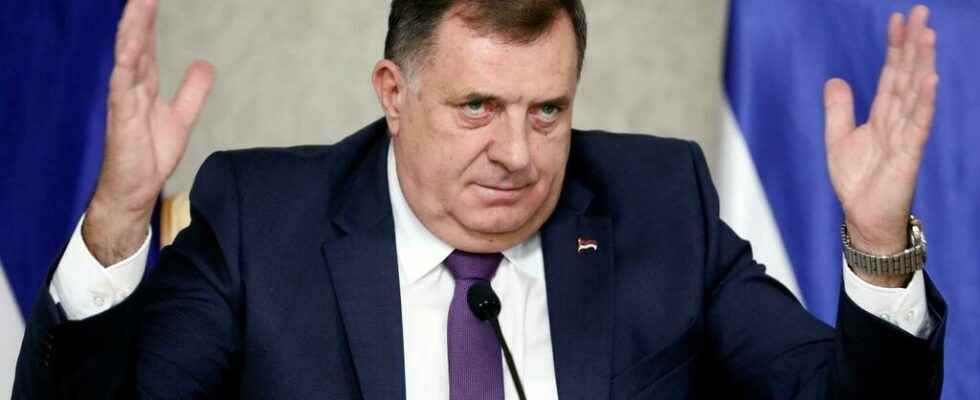This Sunday January 9 marks the thirtieth anniversary of the Republika Srpska. An anniversary celebrated with pomp by the authorities of the Serbian entity in Bosnia and Herzegovina, when a secessionist process has just been launched there. Behind the scenes: Milorad Dodik, the nationalist and secessionist leader who has just been sanctioned by the United States.
It was on December 10, in the parliament of the Republika Srpska (RS), that the secession process was officially launched. In action: Milorad Dodik, 62, the leader of the Bosnian Serbs who for the past fifteen years has adopted a nationalist posture, hostile to the federal state of Bosnia and Herzegovina. A radical positioning that contrasts with his beginnings in politics, much more moderate.
” He started his political career during the war, in the 1990s, and at the time he was in opposition to Radovan Karadžić », Explains Loïc Trégourès, political science teacher at the Catholic Institute in Paris. ” At the time, he was seen by Westerners as someone who could be relied on to push Serbian nationalists out of power in Bosnia. At first, that’s what he did : in the 1996-1997 interviews, for example, he said that Karadžić was to be sent to The Hague… And in those years, he had no problem admitting that what had happened in Srebrenica was a genocide. “
Secession project
In the middle of the 2000s, a change of course: Milorad Dodik denounces the Dayton accords, and criticizes, over the course of inflammatory statements, the functioning of the centralized state. Today, Milorad Dodik does not hesitate to glorify perpetrators of war crimes condemned by international justice – starting with Ratko Mladić – and the leader of the Bosnian Serbs is doing everything to advance the secessionist cause.
” He’s been talking about seceding for fifteen years, so obviously people have a hard time taking him seriously. But there he announced his plan, and he follows it, worries Aline Cateux, doctoral student in anthropology, whom RFI joined in Saravejo. We are in a process of secession that has been launched : it is no longer a working hypothesis, it is in the process of becoming a reality. “
” Protection strategies “
A nightmare scenario for the inhabitants of Bosnia and Herzegovina who remember the horrors of war: the siege of Sarajevo, the massacre of Srebrenica and the 100,000 killed in the deadliest conflict that Europe has known since the end of the Second World War.
” The civilian population is still totally traumatized today, continues Aline Cateux. Faced with the threat of weapons or violence, people react very quickly and very strongly by putting protection strategies in place. Last November, for example, everyone checked the validity of their passports and there were queues in front of the banks, because people were convinced that the central bank was going to close and that they were going to lose everything. their money. “
No popular support
The secession process launched by Milorad Dodik brings back painful memories – among Muslims and Croats, but also among the inhabitants of the Bosnian Serb entity. Paradoxically, even within the RS, the secession project led by Milorad Dodik receives very little support.
” Today there is no popular movement behind this idea in Republika Srpska. Even the opposition to Milorad Dodik, who is however the old party of Karadžić, does not follow him. Not that they are opposed per se to the secession project, but because they think it would lead to war, and people do not want it. What is happening with Milorad Dodik is that he feels in danger on the political scene and that with the approach of the general elections scheduled for fall 2022, he is playing his game. But there is no popular movement behind it and you don’t have people in the streets chanting slogans in favor of secession. “
On the international scene, Milorad Dodik can count on the support of Serbia and Russia. And on the weakness of reactions in the Western camp. If the United States decided this week to sanction the leader of the Bosnian Serbs, Europe remains for the moment almost silent on a subject however explosive – as the history of the XXth century has shown repeatedly.
